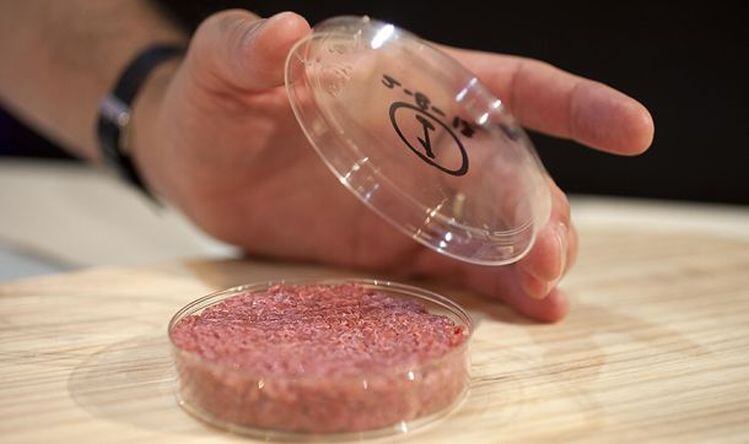Addressing the turf war developing between the two federal agencies over who has primary jurisdiction over meat produced by growing cells in bioreactors (as opposed to animals), Pape argued that “USDA’s experience with traditional meat is not pertinent to cellular meat.”
He added: “The notion than an inspection driven regime makes sense for these kinds of foods makes no sense to me… Is a USDA inspector going to stand in David’s [Bowman, cofounder at clean meat start up Mission Barns and fellow speaker at the IFT education session] facility and stare at a bioreactor?”
Are USDA inspectors going to go to clean meat facilities and stare at bioreactors?
Were USDA to take the lead, predicted Pape, “This will get slow walked… My view on what makes most sense from a public policy perspective is that this should be FDA regulated.”
This is in part because the FDA “already has experience of cellular agriculture on the food and biologics side,” while the USDA is “not used to dealing with new technology,” he said, but also because there is “no evidence that the USDA has the wherewithal or the inclination” to look at clean meat.
As for labeling, being unable to feature a USDA seal on their packaging was likely “not high up on the list” of things keeping clean meat start-ups awake at night, he postulated.
Ultimately however, labeling would likely have to be “a joint effort between USDA and FDA,” predicted Pape.
Asked how cultured meat should be described on pack, he said he was “hard pressed to see how you would name these products without using the word ‘meat,’” but noted that “practically every speaker” at the recent FDA public meeting on cultured meat “used a different term to describe it,” with supporters using phrases such as ‘clean meat,’ ‘cell cultured meat,’ ‘cultured meat’ and ‘cell-based meat,’ and detractors talking about ‘fake meat,’ ‘invitro meat,’ ‘lab meat,’ and ‘synthetic meat.’
He added: “I believe that the nomenclature should be transparent, but not perjorative.”
Echoing comments made by Gregory Jaffe from the Center for Science in the Public Interest at the FDA meeting, Pape said companies in this space were above all keen to prevent cell-cultured meat from being demonized in the way that biotech crops have been, in part because of a “toxic” combination of “no required review, and no disclosure.”
Good Food Institute: The real question is does the production process present impose any new risks for consumers?
So what might the regulatory framework for cultured meat look like?
Asked by FoodNavigator-USA whether a GRAS determination or a food additive-type process (involving pre-market approval from the FDA) might make sense for cultured meat, Good Food Institute director of policy Jessica Almy said it was “premature to say which of those two pathways makes sense.”
She added: “It’s also possible that FDA is going to determine that there is a different kind of pathway to ensure that these products are safe… the real question is does the production process present any new risks for consumers … but what the specifics of an application or a notice would look like are still up in the air.”
Asked about labeling, she said: "USDA is not supposed to use its labeling authority to privilege one industry over another." A recent bill passed in Missouri that would make it unlawful to 'misrepresent' a product as 'meat' if it is not harvested from an animal is "almost certainly unconstitutional [on the grounds that it violates First Amendment rights]," she argued.
"I expect that you might see a legal challenge to this bill soon."
Watch our video with Jessica later this week.
FoodNavigator-USA has asked the USDA for comment regarding which agency should have primary jurisdiction over cultured meat and will update this story if it receives a comment.
“Animal agriculture comes from farming animals, cellular agriculture comes from farming cells.”
Kristopher Gasteratos, founder and president, the Cellular Agriculture Society

MosaMeat: We're looking at 2021 for small scale introduction in restaurants at a premium price
Peter Verstrate, CEO at Dutch clean meat start-up MosaMeat, told delegates at the IFT show that in Europe, Mosameat needed to go through the Novel Food Regulation process, and would be submitting a dossier both about safety and nutritional equivalency to the reference material (eg. beef).
"I think it will be two years in the lab, three years to get to a process design that's scalable, so I think that will take us into 2021 for small scale introduction to restaurants as a premium product, so by 2023 large production capacity will have been installed. It will probably be closer to 10 years before we're in grocery stores [at a price matching that of regular meat products].
Clean meat technology is still "relatively early stage," he said, but noted that costs had come down significantly as companies identified cheaper growth media (and ways to recycle it), developed strategies for boosting the "proliferative capacity" of cells (eg. enabling cell lines to immortalize or replicate indefinitely) and for growing cells in single cell suspension - "tricking cells into thinking that they are attached to a surface using certain peptides for example."
There are also different strategies for ensuring the meat contains a mix of muscle cells (myocytes), fat cells (adipocytes) and connective tissue (fibroblasts), he said, noting also that myoglobin (a protein containing heme that carries and stores oxygen in muscle cells) is critical in giving meat its color and flavor... along with fat. "You also need vitamin B12, which is not present in cultured meat."
"We can't go into detail and we are filing a patent as we speak but we think we have found a solution to scaling the tissue production stage."
One strategy for boosting cells' proliferative capacity is genetically engineering them, he said, but that is a non-starter for many companies given the antipathy to using biotech in food, particularly in Europe, he said. "The amount of doubling that the cells can undertake is limited in our case. The more they can replicate the less times you need to go back to the cow or whatever."
Asked about whether it would be OK to use genetic engineering to produce growth factors in the growth medium, for example, he said: "In Europe, meddling with the actual animal cells is a no go, but for media ingredients to make growth factors made from yeast or algae for example, yes, I expect we'll see companies use genetic modification there."

